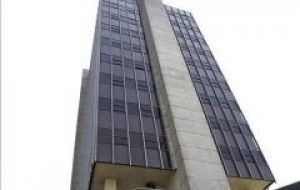MercoPress. South Atlantic News Agency
Brazil increases benchmark rate to fight inflation, but markets feel it’s not enough
 In a divided decision the central bank raised the Selic rate for the first time since July 2011
In a divided decision the central bank raised the Selic rate for the first time since July 2011 Brazil’s central bank on Wednesday raised its benchmark rate for the first time since July 2011 as policy makers seek to slow inflation levels. The bank’s board, led by President Alexandre Tombini, voted 6-to-2 to increase the Selic rate 25 basis points to 7.50% from a record low.
Policy makers said that “the high level of inflation” and “resilience of inflation” required a response, which was tempered by the central bank’s recognition that “external uncertainties” also required “that monetary policy be managed with caution,” according to the board’s statement posted on the bank’s website.
However the late Wednesday announcement had a limited impact on market expectations since Brazil's currency and interest-rate futures fell on Thursday apparently because investors were expecting a more aggressive monetary policy to fight inflation.
President Dilma Rousseff government is facing renewed pressure to contain consumer prices after annual inflation in March breached the central bank’s target range for the first time since November 2011. Rising prices are sapping purchasing power and eroding demand even after officials cut taxes on consumer goods and power bills, and lowered the Selic to 7.25% in October. Retail sales in February fell for the second time in three months.
Brazil will tackle inflation systematically, Rousseff said on April 16, warning that price increases eat into income and profits. Policy makers will not tolerate inflation, Tombini said on April 12.
Annual inflation in Latinamerica’s largest economy accelerated to 6.59% in March from 6.31% a month earlier. That compares with annualized March price increases of 4.25% in Mexico and 1.5% in Chile.
After falling 3.6 percent last year, partly due to increased competition from abroad, industrial production in February plunged the most since December 2008. Retail sales dropped 0.4% in February, falling short of analysts’ forecast of a 1.5% gain.
Growth in Latin America’s largest economy will rebound from 0.9 percent in 2012 to at least 3 percent this year as investment accelerates, Finance Minister Guido Mantega said last month. Brazil’s inflation is declining, and growth won’t generate price increases, Mantega said April 12.
Economists following Brazil have ratcheted down their growth forecast to 3% in the latest weekly central bank survey from a high of 4.5% on June 1. Their inflation forecast for 2013 has risen to 5.68% from 5.60% during the same period, the survey said.




Top Comments
Disclaimer & comment rules-

Read all commentsI have no idea why this 'inflation' came as a surprise.
Apr 18th, 2013 - 09:05 pm 0Anyone remember that the banks were ordered by Dilma to give loans to the populace despite the debt failure rate (all well known) and just what did Dilma think they were going to do with the money?
All together now: SPEND IT on what they want, NOT what the government wanted. It’s called The Mr. Market effect and nobody messes with Mr. Market and wins, nobody.
It is clear that there is no-one in sole charge of financial strategy in Brasil.
Oh dear!
Commenting for this story is now closed.
If you have a Facebook account, become a fan and comment on our Facebook Page!